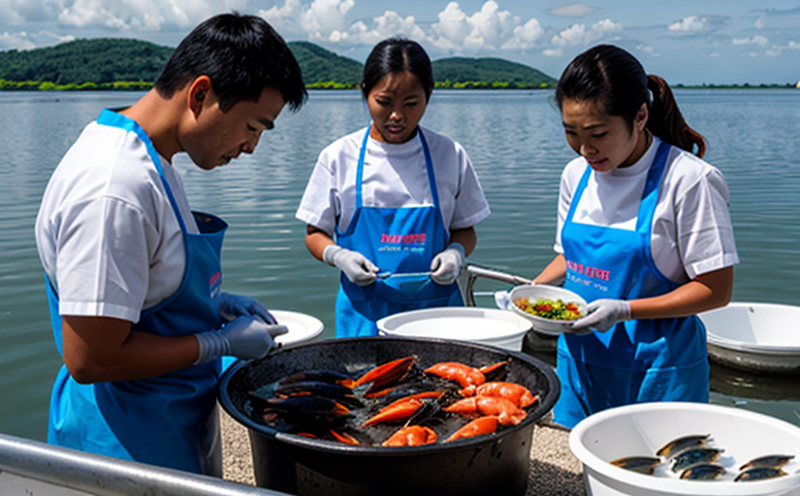ISO 11290 Listeria monocytogenes Testing in Fish
The presence of Listeria monocytogenes in food products, especially seafood and aquaculture, can pose significant health risks. This bacterium is a common cause of gastrointestinal illness, often referred to as "listeriosis." In the context of seafood and aquaculture testing, ensuring compliance with stringent international standards like ISO 11290 is paramount for maintaining product safety.
ISO 11290 specifies methods for the detection of Listeria monocytogenes in fish products. This standard provides a robust framework to identify potential contamination early, allowing for timely corrective actions and preventing the distribution of unsafe seafood. The method is particularly relevant for fish that are consumed raw or minimally processed as they have a higher risk of harboring pathogens.
The testing process involves several critical steps: sample collection, transport, pre-processing, culture conditions, and final identification. Sample collection should be performed in strict accordance with the procedures outlined in ISO 11290 to ensure accuracy. Once collected, samples are transported under refrigerated conditions to prevent spoilage.
Pre-processing of the samples is essential for accurate detection. This includes homogenization of the sample and appropriate dilution if necessary. The culture conditions specified in the standard are critical as they influence the growth rate and viability of Listeria monocytogenes. After incubation, the colonies are identified based on morphological characteristics and biochemical tests.
The significance of ISO 11290 cannot be overstated. It ensures that seafood products meet stringent hygiene standards, protecting public health from the dangers associated with this pathogen. Compliance is not only a legal requirement but also an essential part of maintaining consumer trust in food safety practices.
Failure to adhere to these standards can result in product recalls, damage to brand reputation, and potential legal consequences. Therefore, implementing ISO 11290 is crucial for seafood processors and distributors who want to ensure their products are safe and comply with international regulations.
Listeria monocytogenes testing has become a standard procedure in the food industry, especially within aquaculture, where raw or minimally processed fish pose higher risks. By adhering to ISO 11290, seafood producers can mitigate these risks and ensure product safety.
The importance of this testing cannot be overstated. It is an integral part of quality assurance programs aimed at safeguarding public health. Compliance with standards like ISO 11290 not only meets regulatory requirements but also enhances the reputation of food manufacturers in terms of consumer trust and safety.
Why It Matters
The presence of Listeria monocytogenes in fish products can lead to severe health issues, including gastrointestinal illnesses. This bacterium is particularly dangerous for pregnant women, the elderly, newborns, and individuals with weakened immune systems. Ensuring that seafood meets stringent hygiene standards through methods like ISO 11290 is essential to prevent the spread of this pathogen.
Seafood processors and distributors must adhere strictly to international standards such as ISO 11290 to guarantee product safety. This adherence translates into consumer trust, regulatory compliance, and protection against potential health risks associated with contaminated seafood products.
Reduces the risk of Listeriosis outbreaks among consumers.
Ensures that seafood products meet stringent hygiene standards.
Avoids product recalls due to contamination concerns.
The implementation of ISO 11290 in fish testing is not just a compliance issue; it’s a commitment to public health and safety. By following these guidelines, food processors can prevent the distribution of unsafe seafood products and maintain consumer confidence in their brand.
Compliance with international standards such as ISO 11290 ensures that seafood products are safe for consumption. This is particularly important given the growing global demand for fresh and minimally processed fish, which have a higher risk of harboring pathogens like Listeria monocytogenes. Adhering to these standards not only protects public health but also enhances the reputation of food manufacturers in terms of consumer trust and safety.
The importance of ISO 11290 cannot be overstated. It is an integral part of quality assurance programs aimed at safeguarding public health. Compliance with these guidelines ensures that seafood products are safe for consumption, thus protecting consumers from potential health risks associated with contaminated food.
Eurolab Advantages
At Eurolab, we bring years of experience in laboratory testing and compliance solutions to ensure the safety and quality of your seafood products. Our team of experts is dedicated to providing accurate, reliable, and timely results, adhering strictly to international standards such as ISO 11290.
Our state-of-the-art laboratories are equipped with advanced instrumentation for precise sample processing and analysis.
We employ highly qualified technicians who have extensive experience in seafood testing and compliance.
At Eurolab, we understand the critical importance of adhering to international standards. Our commitment to quality and safety is reflected in our rigorous adherence to ISO 11290, ensuring that your seafood products meet the highest hygiene standards.
We offer a range of services designed to meet the specific needs of the aquaculture sector, including comprehensive testing packages tailored to individual requirements. Our expert team provides guidance on sample collection, transport, and preparation, ensuring that all steps comply with ISO 11290 guidelines.
Our advanced laboratories are equipped with cutting-edge technology to ensure accurate and reliable results. With a focus on precision and efficiency, we deliver timely reports that enable you to make informed decisions about your seafood products’ quality and safety.
We pride ourselves on our commitment to excellence and customer satisfaction. Our expert team is dedicated to providing comprehensive support throughout the testing process, ensuring that you have all the information needed to maintain high standards of product safety and compliance.
Frequently Asked Questions
- Reduces contamination risks in seafood products.
- Aids in preventing Listeriosis outbreaks among consumers.
- Supports sustainable practices by ensuring safe and hygienic food production.





